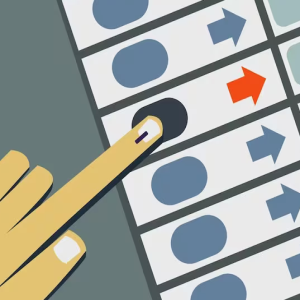
.png) Mukhtar Ahmad
Mukhtar Ahmad

There is hardly any doubt that we live in a new political order. We have a new constitution where the will of the majority community is the law, and a line has been drawn that no organ of the government can cross, no matter what the text of the original Constitution says. The "union of states" concept is replaced with a unitary government that delegates some administrative functions to the provinces. The blatant misuse of the Enforcement Directorate, the CBI and the Income Tax Department to harass and create fear among the opposition is widely and openly used without fear of any court or the Election Commission. Those of us who want to return to a genuinely democratic system where opposition parties rely upon a wide range of constitutional protections, such as the freedoms of association, assembly and ex
We still have a battle to prevent the Constitution's abrogation. The coming parliamentary elections are the first front in this battle. For opposition parties to dent the BJP poll strategy, the opposition, especially the Congress Party, has to clearly project the core ideological difference, the centrality of commitment to secularism and the belief that India is the union of states. In contrast, the BJP believes India is a nation with one ideology, religion, and language.
Unfortunately, Congress, the main opposition party, has been hesitant to take a clear stand in support of minorities, fearing the backlash of the majority. It has been found lacking in quick response to attacks on minorities and the Constitution. Prashant Kishor states, " Congress need to stick to one belief and strive towards dispensing that message". He said, "One cannot keep jumping from one goal to another. Today, it is Rafale, tomorrow, Hindutva...this won't work." He said the grand-old party must focus on "galvanising who are not convinced with this Hindutva. The opposition must make an issue about the misuse of government machinery by the ruling party. The Bharat Sankalp Yatra will see thousands of government officers deployed to towns and villages across the country over the next two months, tasked with speaking about the BJP's successes over the past nine years. The selfie zones created in railway stations and universities clearly misuse these institutions for government propaganda. Issues such as the bulldozer culture can be used as a general problem where the rule of law is not followed.
The blatant use of law enforcement agencies to curb any opposition to government policies in universities has not been exploited by the opposition. The curbing of autonomy in higher education institutions through centralisation and appointing heads of these institutions from a particular ideology should have been a poll strategy. Leaders like Rahul Gandhi and Kanhaiya Kumar should have more dialogue with students. Another point worth talking to students about is the spread of superstitions in society. This is against the constitutional directive principle. The appointments to the institutions of learning, from vice-chancellors to teachers, are being made from RSS background only.
The issues of rapes and those of wrestlers where the government sided with the criminals instead of supporting the victims. The same thing happened in BHU. In all these cases, the perpetrators are from the ruling party. The issues of farmers and the promises made by the government must be hammered in all the election meetings.
One major issue the opposition parties are facing is coordination among themselves. Nowhere is unity shown by opposition parties over any issue. In fact, the opposition parties criticise each other more than they criticise the ruling party. There has been no significant agitation where all or at least a few opposition parties have combined to raise issues of national importance. Pegasus, Rafael, CAA and NRC, subjugation of authority of opposition-ruled states, particularly the role of governors, are issues that affect all the opposition parties. Still, no concerted effort is made by all opposition parties.
The Congress party, headed by Rahul Gandhi, should have the courage to take RSS head-on. No other party except the leftists have talked about RSS's influence in the government. However, left parties have minimal impact, whereas the Congress party is present in more or less in all states of India.
The role of Muslims in any election is vital. However, it is difficult to know how they will vote because no single leader is equally acceptable to all. They are disillusioned with all the parties because none of them takes up their issues seriously. Muslims have also not been participating actively in matters affecting ordinary people. They must think independently without considering how the opposition parties behave towards them. In this election, Muslims should vote for a national party that can take BJP head-on. It would be good if the regional parties allied with the Congress party. Else, Muslims MUST vote for the Congress, at least in this parliamentary election.
Mukhtar Ahmad (The author is a former professor of Electrical Engineering at Aligarh Muslim University Aligarh.)